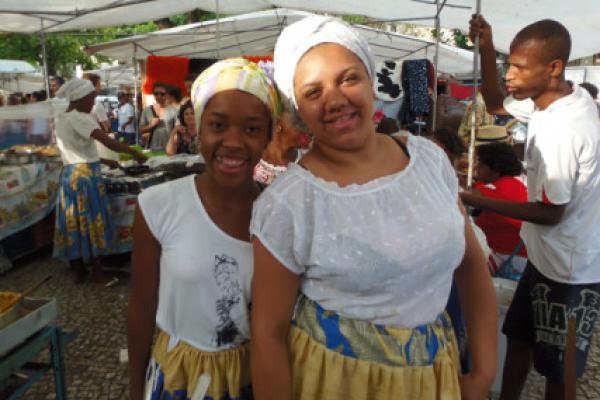The couple practiced Candomble, an African-Brazilian faith with roots in Brazil’s slave trade.
They dressed in white and believed in an all-powerful God who is served by lesser deities, blending Catholicism with African spiritualism, or the belief that the dead communicate with the living.
But their neighbor, who attended a local evangelical church, disapproved. On a balmy day one year ago he shot and killed the husband as he was screwing in a light bulb in his yard.
“We suffered years of abuse for our religious beliefs from our neighbor and even though we complained to the police about it many times, we were told it was not serious enough for them to take action,” said Rosa Maria Lopes, the wife of the slain man, Marcos Antonio Marcelino.
Marcelino’s murder and other incidents of religious intolerance have prompted the Brazilian government to launch a new diversity campaign with the goal of combating religious discrimination.
A country of 200 million people, Brazil is undergoing one of the most dynamic religious shifts in the world today.
Census figures show a decline in the percentage of practicing Roman Catholics and a boom in the number of evangelicals and members of other faiths.
“Brazil has a pluralistic and religiously diverse society, which is the result of colonization and immigration. But we are still far from living in friendly religious co-existence,” said Gabriel Santos, secretary for the Promotion and Defense of Human Rights, a government department.
For Lopes, the steps to fight religious persecution are too little, too late.
She and Marcelino were preparing for a religious meeting in the backyard of their home on the island of Itaparica, off the coast of Bahia when the murder took place.
Their neighbor, Manoel Correia, is now awaiting trial in prison.
“On the night that my husband died, our neighbor came home drunk and started calling our religion evil,” Lopes said.
The number of complaints received by the religious intolerance Dial 100 hotline set up by the government in 2011 grew by a whopping 600 percent, to 109 reported incidents in 2012, up from 15 the year earlier. The majority of complaints were made by members of the African religions, Candomble and the closely related Umbanda faith.
In most of the cases the perpetrators are evangelicals or Pentecostals. Preliminary reports for 2013 are expected to be even higher, with 91 complaints already recorded in August.
“We can’t fully explain why religious intolerance is increasing, but one indicator is that some neo-Pentecostal churches have been preaching hatred in the pews and on the Web,” said Carlos Alberto de Souza, ombudsman for the Department for Policies to Promote Racial Equality.
“There is at least one known case of a church whose spiritual leader preached hatred against African religions, linking them to the devil,” de Souza said. “We know that this kind of preaching influences many of the followers.”
There is no official religion in Brazil and the state remains neutral and impartial to different faiths. In 2011 a Pew Research study revealed that among the 25 most populous countries, Brazil was the most religiously nonrestrictive nation on the planet.
The country’s 1988 Constitution guarantees the protection of places of worship and their rites, and legislation in 1997 criminalizes the practice of discrimination or prejudice against religions with prison penalties of one to three years.
Despite this, there has been an emergence of discriminatory practices by public officials. In 2011, the district attorney of Santa Catarina, banned an Umbanda house of worship in Florianopolis from sacrificing domestic animals during ceremonies without state permission.
In Rio de Janeiro, the city’s Commission for Combating Religious Intolerance is urging people to take legal action against perpetrators who hound followers of African religions out of their communities.
One Candomble member, who asked to remain anonymous, revealed how drug traffickers who had converted to Christianity in prison drove her out of her home in a Rio de Janeiro “favela,” or slum. Once released, they joined the evangelical church in the shantytown to increase their power base.
“They warned me my life was in danger if I disrespected them,” she said. “In late 2010, I couldn’t bear the threats anymore so I left.”
Ivanir dos Santos, president of the city’s religious intolerance committee, said there are numerous cases of these crimes.
“We need to make the law work,” he said. “We intend to put together a dossier on these violations and take it to the government because we want legal action taken against these people."
Janet Tappin Coelho writes for Religion News Service. Via RNS.
Got something to say about what you're reading? We value your feedback!
